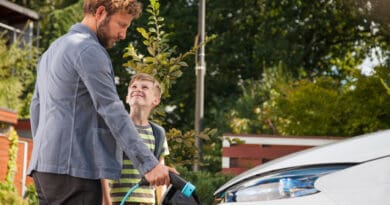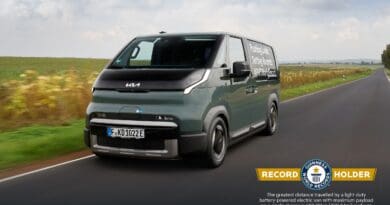
VW & Uber partner on EV project to provide sustainable transport options
Volkswagen has launched a pilot project with Uber to utilise its electric vehicles as part of the mobility service’s push for sustainable transport options.
The objective of the pilot project is to use year-old e-Golf models within Berlin. While the number of vehicles has not been confirmed, VW has suggested it could be a three-digit figure. Uber hire-car partners were informed of the partnership and its possibilities in a virtual event.
Using the e-Golf for this project is a logical choice for VW and Uber. The German carmaker has already gained experience of using the model in a mobility service, having run it within its ‘We Share’ programme since 2018.
Going green
Drivers now have the option to switch to the battery-electric vehicle (BEV) in the Berlin area. The move comes after Uber announced plans to move to 100% electric-powered vehicles in the US, Canada and major European cities by 2030. Launching this pilot project now will allow the service provider to assess the demand and capabilities of running an electric fleet in the German capital.
‘We are pleased to have gained Volkswagen, one of the world’s leading drivers for e-mobility, as a partner for our intermediation platform. Electric vehicles from Volkswagen are a perfect match for our sustainable ‘Uber Green’ concept,’ commented Christoph Weigler, general manager, Uber DACH. ‘This cooperation offers our hire car partners an economically attractive possibility of switching to zero-emission drive systems at short notice. In addition, our experience shows that people are considerably more open to the topic of e-mobility after their first ride in an all-electric vehicle.’
As part of its e-offensive, the Volkswagen brand plans to offer electric cars in all major vehicle segments by 2022. The carmaker is investing €33 billion group-wide by 2024, €11 billion of which will be invested by the Volkswagen brand alone. The Volkswagen brand expects to produce 1.5 million e-cars in 2025.
‘Through our cooperation with Uber, we are helping improve air quality in urban areas with our locally carbon-neutral electric vehicles,’ said Holger Santel, head of Sales and Marketing Germany for the Volkswagen Passenger Car brand. ‘In addition, with the demanding continuous operation of battery-electric vehicles in a ride-hailing service, we will gain valuable experience, which we will be able to use for future vehicles.’
Perfect partnership
Uber is one of the leading mobility-service providers in the world, while VW is the leading automotive brand in Europe. Both companies are pushing forward with green initiatives, and therefore joining forces will allow them to work together in overcoming the challenges facing the mobility sector in years to come.
With traditional ownership patterns changing, carmakers are looking to mobility services to provide additional income. Some have started their own, others are partnering with larger outfits, while others, including VW, are doing both.
This increase in mobility-service usage will ultimately lead to a rise in emissions output from the sector, and their popularity in urban locations will, in turn, add to the air pollution problems being faced by many cities in Europe. For Uber, therefore, its pledge to ‘go green’ by 2040, including 100% electric fleets in specific locations by 2030, will prevent the company from being part of the overall air pollution problem. With coronavirus (COVID-19) also pushing consumers away from public transport and towards more isolated means of mobilty, services like Uber’s could see a real increase in useage.
For VW, their electric offensive is taking off. This year the brand launched the ID.3, its first bespoke BEV. The ID.4 BEV SUV has also been announced, with other models expected to follow in the coming years – alongside electrified options for the rest of its range. While no mention of a future collaboration beyond the pilot project was mentioned in its statement, if successful, VW will likely want more of its BEV models included in any deal between the two companies.





